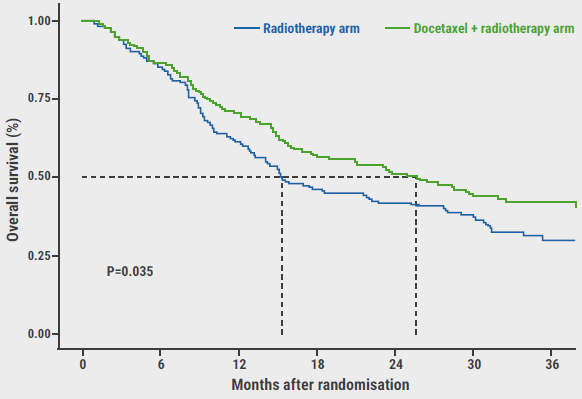https://doi.org/10.55788/c49a680e
Patients with initially unresectable CRLM are treated with induction systemic treatment, however there is no consensus on the criteria for resectability of CRLM and on the systemic induction regimen that should be administered to these patients. The phase 3 CAIRO5 trial (NCT02162563) installed a liver panel to confirm the unresectability (by surgery-only in one stage) of patients with initially unresectable CRLM [1]. Hereafter, those with RAS/BRAFV600E-mutated and/or right-sided primary tumours (n=294) were randomised to FOLFOX/FOLFIRI plus bevacizumab (doublet chemotherapy) or FOLFOXIRI plus bevacizumab (triplet chemotherapy). Progression-free survival (PFS) was the primary endpoint. Results were presented by Prof. Cornelis Punt (University Medical Center Utrecht, the Netherlands).
After a median follow-up of 41 months, the median PFS was significantly longer in patients who had received FOLFOXIRI than in those that had received doublet chemotherapy (10.6 vs 9.0 months; HR 0.77; P=0.038). At this point in time, the overall survival data was not yet mature. Furthermore, the subgroup analysis did not demonstrate an association between baseline unresectability status or mutation status and PFS. The overall response rate was higher in the triplet chemotherapy arm (53.5% vs 33.3%; P<0.001). However, grade ≥3 adverse events were more common in patients who underwent triplet chemotherapy than in those who underwent doublet chemotherapy (75.7% vs 59.2%; P=0.003), mostly due to an increased rate of neutropenia (38.2% vs 12.9%) and diarrhoea (19.4% vs 3.4%).
CAIRO5 is the first randomised trial to prospectively demonstrate the clinical benefit of triplet versus doublet chemotherapy in patients with initially unresectable CRLM and right-sided and/or RAS/BRAFV600E-mutated primary tumours. Prof. Punt added that the use of a liver expert panel is feasible and allows the selection of an increased number of patients who are suitable to receive local treatment with curative intent.
- Punt CJA, et al. FOLFOXIRI + bevacizumab versus FOLFOX/FOLFIRI + bevacizumab in patients with initially unresectable colorectal liver metastases (CRLM) and right-sided and/or RAS/BRAFV600E-mutated primary tumor: Phase III CAIRO5 study of the Dutch Colorectal Cancer Group. LBA3506, ASCO 2022 Annual Meeting, 3–7 June, Chicago, IL, USA.
Copyright ©2022 Medicom Medical Publishers
Posted on
Previous Article
« To resect or not to resect primary tumours in stage IV colon cancer? Next Article
Spectacular results for dostarlimab in mismatch repair deficient rectal cancer »
« To resect or not to resect primary tumours in stage IV colon cancer? Next Article
Spectacular results for dostarlimab in mismatch repair deficient rectal cancer »
Table of Contents: ASCO 2022
Featured articles
Breast Cancer
Sacituzumab govitecan meets primary endpoint
Shaky OS results of palbociclib in ER-positive/HER2-negative breast cancer
Practice-changing results of T-DXd in HER2-low breast cancer
SET2,3 to inform on chemotherapy decisions in ER-positive breast cancer
Metastasis-directed therapy fails in oligometastatic breast cancer
Analysis by residual cancer burden further clarifies effect of pembrolizumab
Contribution of metastatic therapies on mortality reduction in breast cancer
Radiotherapy may be omitted in breast cancer patients
Promising data for ribociclib after progression on ET plus CDK4/6 inhibitors in HR-positive/HER2-negative metastatic breast cancer
7-gene biosignature: Benefits of endocrine therapy and radiotherapy in breast cancer risk groups
Lung Cancer
Additional tiragolumab does not help patients with untreated small cell lung cancer
Success for serplulimab plus chemotherapy in small cell lung cancer
Adagrasib safe and clinically active in non-small cell lung cancer
Long-term benefits of combined immunotherapy over chemotherapy in non-small cell lung cancer
Effect of KRAS mutations and PD-L1 expression on therapy response in non-small cell lung cancer
Melanoma
First results on distant metastasis-free survival in stage II melanoma
Higher response rates for concurrent triple therapy versus sequential therapy in melanoma
Genitourinary Cancers
Exploratory treatment options fail in ccRCC
Adjuvant everolimus did not benefit high-risk renal cell carcinoma
Cabozantinib fails as first-line maintenance therapy in urothelial cancer
177Lu-PSMA-617 is a valid treatment option for PSMA-positive mCRPC
Enzalutamide performs well in metastatic hormone-sensitive prostate cancer
Haematologic Malignancies
Autologous stem cell transplantation plus RVd improves PFS in multiple myeloma
Novel first-line treatment option for mantle cell lymphoma
Promising results for novel CAR-T therapy in relapsed/refractory multiple myeloma
Gastrointestinal Cancers
Panitumumab beats bevacizumab in RAS wildtype left-sided metastatic colorectal cancer
Spectacular results for dostarlimab in mismatch repair deficient rectal cancer
Triplet chemotherapy beats doublet chemotherapy in colorectal cancer liver metastases
To resect or not to resect primary tumours in stage IV colon cancer?
Novel treatment option for KRAS wildtype pancreatic cancer
Gynaecological Cancers
Primary results of rucaparib in ovarian cancer
Trabectedin not superior to chemotherapy in recurrent epithelial ovarian cancer
Encouraging results of relacorilant in ovarian cancer
Miscellaneous Topics
Bacterial decolonisation effective against radiation dermatitis
New standard-of-care for cisplatin-ineligible locally advanced head and neck squamous cell carcinoma
Ifosfamide is likely to be the go-to therapy in recurrent Ewing sarcoma
Dabrafenib plus trametinib candidates for standard-of-care in BRAF V600-mutated paediatric low-grade glioma
© 2024 Medicom Medical Publishers. All rights reserved. Terms and Conditions | Privacy Policy



